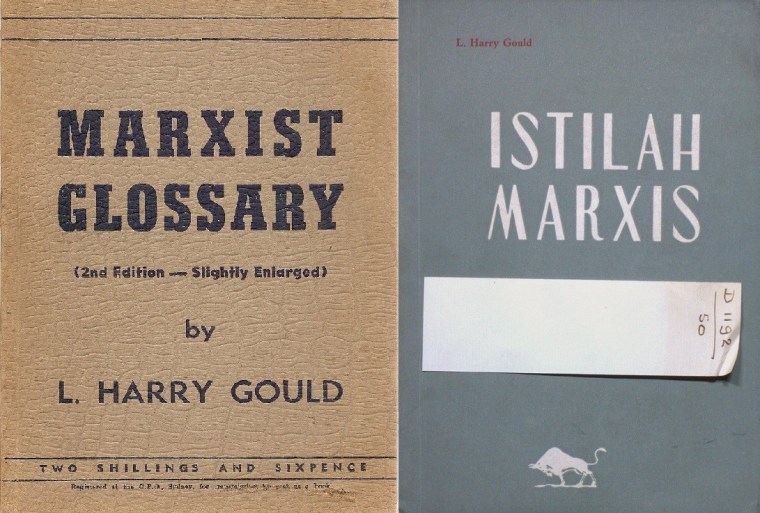Marc-William Palen
History Department, University of Exeter
Follow on Twitter @MWPalen
From the global networks of Indonesian communism to historians’ revolt against the National Archives, here are this week’s top picks in imperial and global history.
Indonesian Communism and Global Networks of Translation: The Case of L. Harry Gould’s Marxist Glossary
Oliver Crawford
Afro-Asian Visions
The proclamation of the Indonesian independence on 17 August 1945, and the sudden evaporation of press controls that came with it, triggered a rush to translate foreign works into Indonesian. Especially in demand were radical foreign political texts which had been difficult or impossible to obtain during the Japanese occupation (1942–5) and the prior Dutch colonial period.
Jajasan Pembaruan, a publisher formed in 1951 to promote the dissemination of Marxist writings in Indonesia, was particularly prolific in its output of Indonesian translations in the post-independence decades. It published over 70 translations of Marxist texts between 1952 and 1965. These included not only the works of the canonical European Communists — Marx, Engels, Lenin and Stalin — but also the writings of Marxists from China (Mao Zedong, Liu Shaoqi), India (Ajoy Kumar Ghosh), Vietnam (Ho Chi Minh, Truong Chinh), North Korea (Kim Il Sung) and Australia (L.L. Sharkey, L. Harry Gould). The chains of transmission involved in producing these translations reveal a long and winding network of textual diffusion. [continue reading]
The Imperial Presidency Helped Bring Us to the Brink of War in Iran
Branko Marcetic
Jacobin
Yesterday’s assassination of Qassem Soleimani, an illegal and reckless escalation of the US-Iran tensions Trump has deliberately stoked throughout his term, is a bit like Trump’s victory in 2016: nothing that came before should make us the least bit surprised it happened, yet the outcome is so alarming that you can’t help but feel shaken.
As experts have already pointed out, Soleimani’s killing has the potential to spark something very dangerous. Soleimani was one of the country’s most powerful military figures, the head of its elite Quds Force who essentially ran Iranian military and foreign policy in the region. A war hero labeled “a living martyr of the revolution” by Iran’s Supreme Leader, he was a hugely popular figure who was the subject of rhapsodizing state propaganda, and who had future political leadership possibly in his sights. [continue reading]
Colossus Wears Tweed
Quinn Slobodian
Dissent
Colossus wears tweed. The claim seems outrageous on its face. How has it been supported? The power of economists has been easiest to see beyond Europe and North America. From the 1960s through the 1990s, authoritarianism and academic economics often went hand-in-mailed-glove, with advice about suppressing organized labor and beating inflation used in service of projects of export-led development. One scholar describes the “Berkeley mafia” in Suharto’s Indonesia as “economists with guns.”
The signature case of economics as an accessory to terror is Augusto Pinochet’s Chile. Milton Friedman, Friedrich Hayek, and James M. Buchanan all traveled to the country after the 1973 coup against the democratically elected Salvador Allende. [continue reading]
Marine Society boy to master mariner to pauper – Part 1
Margaret Makepeace
Untold Lives Blog
We met George Byworth in our story about the East India Company and Marine Society boys. He was given as an example of a boy apprentice who made good of the opportunity offered by the Marine Society. Here we look at his interesting life in more detail.
George was born in London, the son of watchmaker Thomas Byworth and his wife Mary. His baptism record at St James Clerkenwell from March 1807 gives his date of birth as 23 February 1807. This tallies with the age given on his death certificate. However records from the Marine Society and the Board of Trade say George was 14 in March 1823 and 15½ in September 1824, suggesting he was born in 1809. Why the discrepancy? From March 1823 to May 1824 George served in the East India Company ship Scaleby Castle on a voyage to Bombay and China. [continue reading]
Historians revolt over plan for National Archives limit
Mark Bridge
London Times
Historians have urged the National Archives to scrap plans to curtail the number of documents they can order, saying it threatens their livelihoods and would “impoverish the nation’s memory”. The change, on trial for six months from March, will limit users to 12 documents a day, as well as up to 12 ordered in advance. Historians told The Times that they often ordered far more records than that to make the most of their time at Kew in southwest London.
The archives’ management said that the changes were based on an analysis of typical usage and would improve efficiency. Historians claim that it is a “management consultant-style” move that failed to take into account the needs of professional historians and academics. [continue reading]


You must be logged in to post a comment.